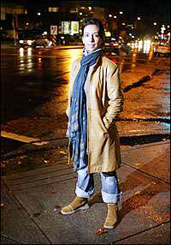Invitation
Program
Devyani Saltzman
Book Launch
Synopsis
Photos
Press
Reviews |
| |
| Devyani Saltzman's "Shooting Water" : TUESDAY APRIL 18, 2006 |
| |
 Devyani Saltzman details her experience working for her mother, Deepa Mehta, in her debut book, Shooting Water.Saltzman’s goal was reconciliation with the Canadian film director.
Devyani Saltzman details her experience working for her mother, Deepa Mehta, in her debut book, Shooting Water.Saltzman’s goal was reconciliation with the Canadian film director. |
TORONTO STAR
November
5, 2005
Neck deep in turbulent Water
Mehta's daughter writes of healing rift with mother
Behind scenes during riots, dark side of Hinduism
Prithi Yelaja
Staff Reporter
In the powerful opening scene of Devyani Saltzman's new book, she recounts having to choose between her parents at age 11.
It was 1991, at the Cannes Film Festival. Her mother, Toronto film director Deepa Mehta, and her father, producer Paul Saltzman, were divorcing, and asked her to pick which of them she wanted to live with.
Saltzman chose her father. "I felt safe with him, while my mother's pain and anger sometimes scared me," she writes in Shooting Water, her debut book. It was a decision that left her plagued with guilt.
In 1999, hoping to heal her strained relationship with her mother, Saltzman went to India to be a camera assistant on Mehta's film Water, a 1930s period piece about Hindu widows that opened in theatres yesterday and headlined this year's Toronto International Film Festival.
Her book weaves her personal journey toward healing deep childhood wounds with the story of Mehta's five-year struggle to get Water made - after riots, effigy burnings and death threats by right-wing zealots got the shoot shut down in India within a week.
"It's such an easy sound bite: 'Controversial film shut down.' But nobody asked why, and the deeper reasons behind it. I wanted to tell the story for myself but also for my mom, because I saw what she went through," says Saltzman, 25, who now shares a home with Mehta in the Annex.
Born and raised in Toronto, Saltzman had been going to India regularly since she was 4 weeks old to visit her grandparents, but the ugliness surrounding the shooting of Water in Varanasi, the Hindu holy city, opened her eyes, she says.
"I had never seen Hinduism in that way. This whole idea that the film was anti-Hindu showed me an aspect of India and religion that I had never seen. ... It showed me how blind faith can lead to violence."
"All nations indulge in a bit of myth-making to bind their people together," according to Indian writer Pavan K. Varma, whom Saltzman quotes.
"Water was one of the casualties of maintaining that myth," she says. "That's the crux of why we were shut down. ... I don't think people liked the idea of looking at a darker side of their nation. Not everybody, but definitely the RSS (Rashtriya Swayamsevak Sangh, the Hindu party's cultural wing) and BJP (Bharatiya Janata Party), whose campaign slogan was 'India Shining.'
"This is not a happy side of Hinduism or the patriarchy, and therefore the shutdown was: 'We don't want to see this in our national myth.' "
Saltzman also provides behind-the-scenes tidbits, such as Mehta's decision not to recast certain actors when filming resumed five years later, under the pseudonym Full Moon.
Dropping Nandita Das from the role of Kalyani, because the actress no longer possessed the innocence the character required, cost Mehta their friendship.
Shabana Azmi was dropped as Shakuntula because Mehta feared that her high profile as a political-rights activist and former member of the Indian parliament might endanger the secrecy of the shoot.
Hunky Indian movie star John Abraham was cast in the male lead after Mehta's mother saw him on television and perceived "sensitivity behind the muscle."
Even as a Hindu priest performed a puja to bless the crew and cast on the first day of filming, trouble was brewing. After shooting wrapped that day, Mehta watched TV coverage of rioters burning her Water sets. Her executive producer called for an emergency meeting the next day, and Mehta crawled into her hotel room bed with an Agatha Christie novel. That was "as much a wall as a refuge," Saltzman writes.
The making of the film coincided with Saltzman's coming of age. She talks with poignant honesty about her emotional breakdown while at Oxford University - she completed an anthropology/sociology degree on breaks between film shoots. She fell in love for the first time while in India, and was rejected.
"In the journey I went through a rite of passage. Really, Shooting Water is about growing up through an emotional relationship with my mom, through politics and through cinema," she says.
Threaded throughout the story is Saltzman's search for belonging, a yearning she felt acutely as a Jewish/Indian child of divorce, shuffling between two homes and two cultures and feeling she belonged to neither.
The theme appears to have struck a chord with other children of divorce and those of mixed heritage backgrounds, who have flocked to her book signings, she says.
"I've met more mixed Indian/white kids in the last couple of months than I've met in my whole life. It's weird. It's like, where did you all come from? But that's Canada today."
It was Saltzman who nursed Mehta when she had a 104-degree fever during the final days of shooting. They finally made their peace.
"I always loved you. And I know why you made your choice ... I understand," Mehta tells her. Saltzman says she was then able to forgive herself.
In the book's afterword, Mehta writes that the rebirth of Water coincided with the rebirth of her relationship with her daughter.
"As I read her book, I alternately smile and feel perturbed. Perturbed by her pain, because as parents we let her down. Smile because her honesty and courage made this redemption possible." |
|
|

